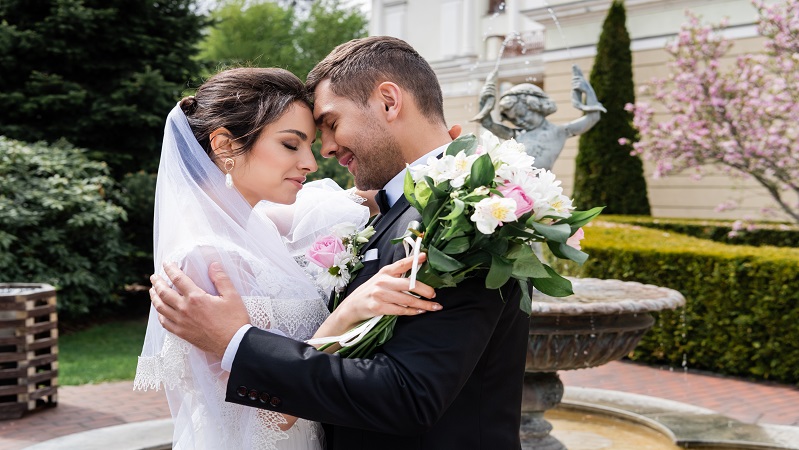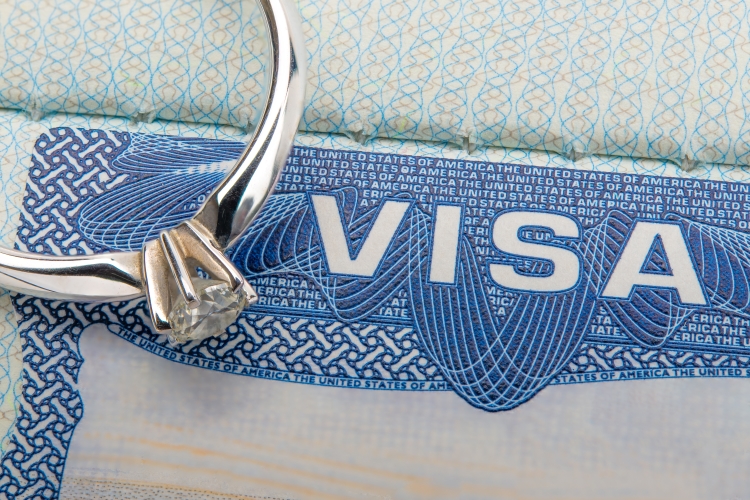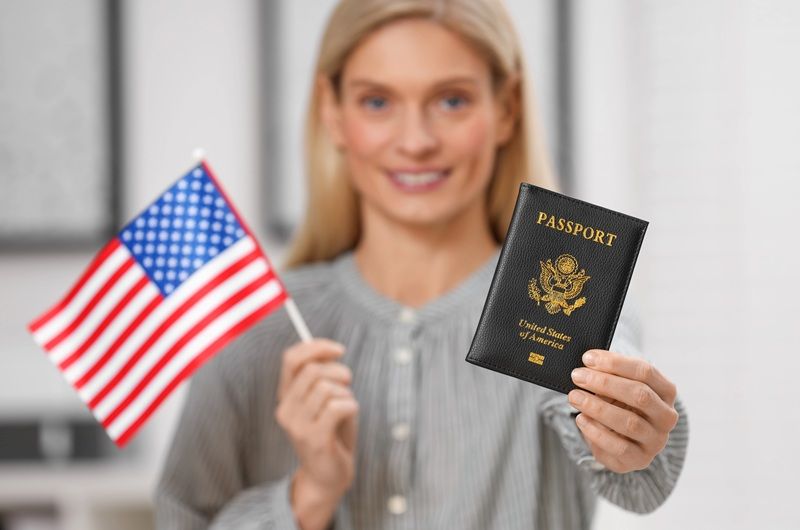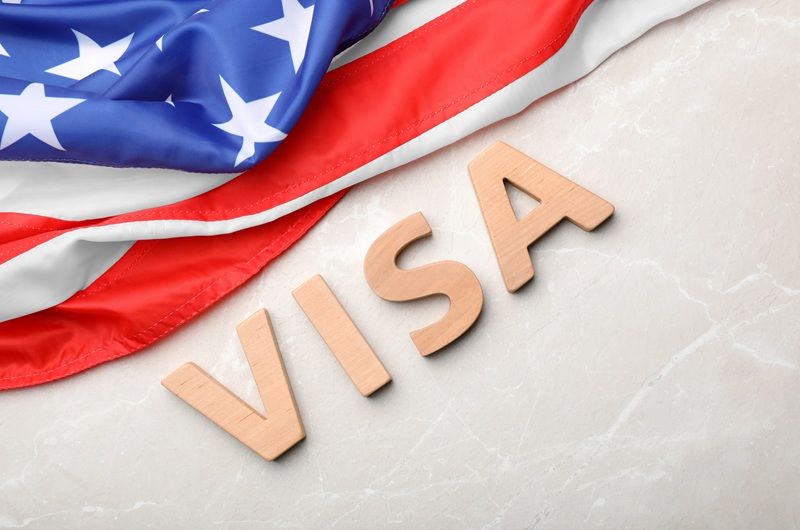Navigating The Marriage Green Card Process
You’re about to embark on a brighter future with your spouse by obtaining a marriage green card. This document will allow your spouse to live and work permanently in the United States, making your dreams of building a life together a reality.
This blog will guide you through obtaining a marriage green card, covering everything from eligibility requirements, the application process, and common challenges, to what to expect after approval.
Whether you’re a U.S. citizen or a legal permanent resident, you want to ensure that you and your spouse are fully prepared for every step of the journey.

Requirements For A Marriage Green Card
Before obtaining a marriage green card, you must understand the eligibility requirements. Take note of the following:
Proof Of Marriage
One of the most important eligibility requirements for a marriage green card is proving to USCIS that your marriage is genuine. This is crucial, as USCIS will deny your application if they suspect your marriage is a sham designed solely to obtain immigration benefits.
To prove the validity of your marriage, you’ll need to provide evidence of your relationship, such as:
- Wedding photos.
- Joint bank statements.
- Joint utility bills.
- Joint lease or mortgage agreements.
- Joint insurance policies.
- Affidavits from friends and family members who have known you both as a couple.
It’s also essential to make sure that your marriage is legally performed. USCIS will not recognize common-law marriages or ceremonies performed in foreign countries without proper documentation. You’ll need to provide a marriage certificate issued by the government of the place where the marriage occurred.
Keep in mind that USCIS will examine all of the evidence you provide very closely, so it’s essential to ensure that it’s accurate and complete. If you have doubts about what evidence to provide, it may be a good idea to consult with an immigration attorney.
Additionally, it’s important to note that USCIS will consider the timing of your marriage regarding your application for a green card. If you married within 90 days of entering the U.S., USCIS may suspect your marriage is a sham and subject your application to additional scrutiny.
Proof Of U.S. Citizenship Or Legal Permanent Residency
To sponsor your spouse for a marriage green card, you must either be a U.S. citizen or a Green Card holder. This means that you’ll need to provide proof of your status to USCIS. The following proves you are a U.S. citizen.
- A U.S. passport.
- A birth certificate issued by a U.S. state or territory.
- Naturalization or citizenship certificate.
If you’re a legal permanent resident, you’ll need to provide a copy of your green card.
It’s essential to make sure that the documents you provide are original or certified copies, as USCIS will not accept photocopies or faxes. Additionally, if your green card is expired, you’ll need to renew it before you can sponsor your spouse for a green card.
You may consider hiring an attorney to help you ensure that you have all the necessary documents and that they are in order before submitting your application.
It’s also important to note that if you’re a U.S. citizen, you may be able to file for your spouse from abroad using consular processing. In this case, you’ll need to work with the U.S. Department of State, not USCIS. An immigration attorney can help you determine which process is best for your situation.
Financial Support Requirements
In addition to proof of your marriage and U.S. citizenship or legal permanent residency, you’ll also need to prove that you have the financial means to support your spouse once they arrive in the U.S. This is to ensure that your spouse will not become a public charge and will be able to support themselves without relying on government benefits.
To demonstrate financial support, you’ll need to submit an Affidavit of Support (Form I-864) along with your green card application. This form is a contract between you (the sponsor) and the U.S. government in which you agree to provide financial support to your spouse if necessary.
You’ll need to show that your household income is at least 125% of the Federal Poverty Guidelines for your household size. You can demonstrate this by providing documentation such as:
- Pay stubs from the last six months.
- Federal tax returns from the last two years.
- Proof of any additional sources of income, such as retirement or investment income.
If your income is not high enough to meet the financial support requirements, you may be able to include a co-sponsor on your Affidavit of Support. A co-sponsor must be an American citizen or have a legal permanent resident status. The co-sponsor must also have the financial means to support your spouse if necessary.
It’s essential to ensure that your Affidavit of Support is accurate and complete, as USCIS will use this form to determine your eligibility for a marriage green card.
Household Income Requirements For Members of Military Service
If you’re a U.S. military member, special provisions may allow you to sponsor your spouse for a green card without meeting the standard financial support requirements.
According to U.S. immigration law, active-duty military members are considered to have met the financial support requirements if their household income is at least 100% of the Federal Poverty Guidelines for their household size. This means that active-duty military members do not have to submit an Affidavit of Support but will still need to provide proof of their military status, such as a copy of their military ID card or a letter from their commanding officer.
Additionally, if you’re a military member and your household income is less than 100% of the Federal Poverty Guidelines, you may still be able to sponsor your spouse for a green card if you demonstrate that you will soon be able to meet the financial support requirements. This can be done by providing evidence of upcoming military pay increases or other sources of future income.
It’s important to note that these provisions apply only to active-duty military members, not veterans or dependents. If you’re a veteran or dependent, you’ll need to meet the standard financial support requirements to sponsor your spouse for a green card.
Background Checks
To obtain a marriage green card, you and your spouse must undergo background checks by U.S. immigration authorities. These checks aim to ensure the security and safety of the U.S. and prevent fraud or abuse of the immigration system.
You will be required to submit fingerprints and undergo FBI criminal background checks. These checks will verify that neither of you has a criminal history that would make you ineligible for a green card.
In addition, U.S. immigration authorities will also review your immigration history, including any previous applications for immigration benefits. They will also check for any red flags, such as last immigration violations, fraud, or misrepresentation.
It’s essential to be truthful and upfront about any issues that may arise during the background check process, as attempting to conceal or misrepresent information can have serious consequences, including denial of your green card application and potential immigration consequences in the future.
With the background checks completed and all necessary information gathered, the next step in the journey to obtaining a marriage green card is to navigate the actual process itself.
The Marriage Green Card Process
The process of obtaining a marriage green card involves several steps and requires several forms to be completed.
The marriage green card process typically involves the following steps:
- Submit the I-130 petition: This petition must include proof of marriage, U.S. citizenship or legal permanent residency, and other supporting documents.
- Attend the interview: The purpose of the discussion is to verify the authenticity of your marriage and to ensure that it is not a sham marriage entered into for the sole purpose of obtaining immigration benefits.
- Submit the adjustment of status application: If your spouse is currently in the U.S., they may need to adjust their status to a green card holder by submitting an adjustment of status application (Form I-485, Application to Register Permanent Residence, or Adjust Status).
- Attend consular processing: If your spouse is outside the U.S., they will need to attend consular processing, which involves completing the appropriate forms, such as the DS-260 Immigrant Visa Electronic Application.
- Wait for the decision: After all required forms have been submitted and any necessary interviews have been conducted, USCIS will review the information provided and decide on your marriage green card application. You’ll receive your green card in the mail if your application is approved. If it’s denied, you’ll receive a written explanation of the reason for the denial.
- Renew your green card: Once you receive it, it will be valid for two years. Before it expires, you’ll need to renew it by submitting a new I-751 petition (Form I-751, Petition to Remove Conditions on Residence) to USCIS. This petition must include proof that your marriage is still genuine and ongoing.
The marriage green card process can take several months or even several years to complete, depending on various factors such as processing times, the complexity of your case, and any complications that may arise. It’s essential to stay informed about your case’s status and respond promptly to any requests for additional information or documentation from USCIS.
Despite the clear steps outlined in the marriage green card process, it can still be a complex and challenging process, especially for those unfamiliar with U.S. immigration law and procedures. That’s why many individuals seeking a marriage green card choose to seek the assistance of an immigration attorney.

The Need For Immigration Attorney’s Assistance
Navigating the marriage green card process can be complex and overwhelming, but an experienced immigration attorney can provide valuable guidance and support throughout the process. Hiring an immigration attorney from a reputable firm like Lincoln-Goldfinch Law – Abogados de Inmigración can offer several advantages, including a thorough review of eligibility requirements, preparation and submission of forms, and advocacy in case of any complications or challenges. By working with an immigration attorney from Lincoln-Goldfinch Law – Abogados de Inmigración, you can increase your chances of a successful and timely marriage green card application.
Contact A U.S. Immigration Attorney Today!
Categories
How To Find Us
What Our Clients Say
“This Lawfirm is great, very professional and helpful. I love that they are always in communication and always available for when you have questions . 100% recommended by me and my family. Thank you Lincoln-Goldfinch Law – Abogados de Inmigración”





